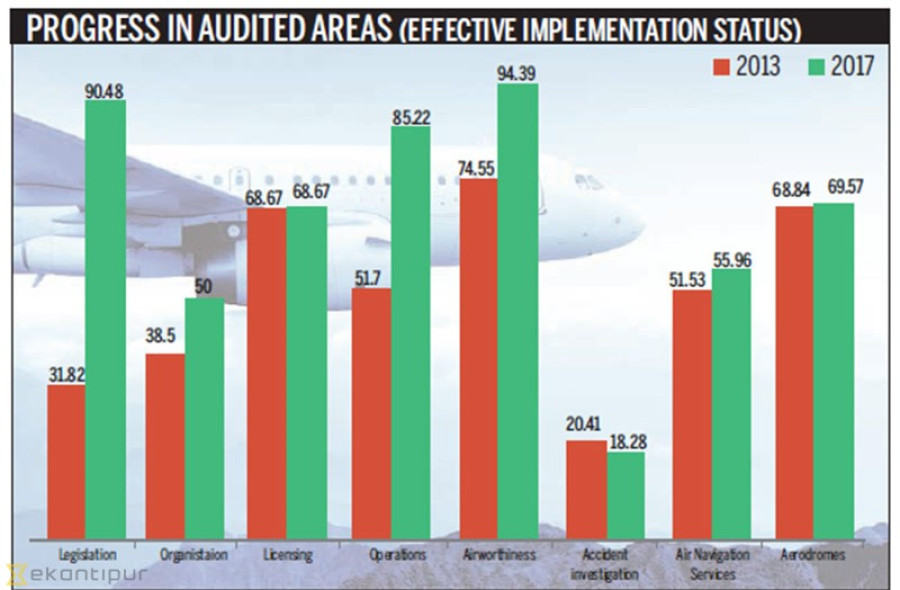National
Nepal offloads Icao safety concern tag
The International Civil Aviation Organisation (Icao) has removed the “significant safety concerns” (SSC) tag it had put on Nepal four years ago.
Sangam Prasain
The International Civil Aviation Organisation (Icao) has removed the “significant safety concerns” (SSC) tag it had put on Nepal four years ago.
The Civil Aviation Authority of Nepal (Caan) on Friday made an official announcement that Nepal “is no longer” in the global civil aviation watchdog’s bad books.

“We have passed the safety audit conducted by Icao’s Coordinated Validation Mission (ICVM),” said Caan Director General Sanjiv Gautam at a press meet in Kathmandu on Friday. “Our safety standard has improved better than expected,” he said. “But this is not the end. We have many challenges ahead. We all need to be careful about safety as its indicators keep on fluctuating all the time.”
The UN supervisory body had put the SSC tag on Nepal’s aviation sector in its audit report in 2013—a follow up of 2009 audit-after assessing that Nepal’s safety standard had not improved on par with the global standards.
Nepal’s largest helicopter Shree Airlines was the first casualty of the SSC. Its international chartered services with the United Nations World Food Programme were immediately withdrawn.
As fallout of the SCC, Nepal Airlines Corporation (NAC) was prevented from obtaining an operating authorisation in China. It has also affected the private carrier Himalaya Airlines’ plan to expand its wings to Hong Kong, Saudi Arabia and some other countries.
NAC’s worry had grown of late with the Icao SSC tag, for it has plans afoot to connect London and Australia after acquiring Airbus A330 jets. International airlines and travellers hesitate to travel to a country whose air safety is questioned by Icao.
The 2013 audit report had pointed that Nepal’s score of 55.01 percent in effective implementation (EI) of critical elements of safety oversight system was way below the global average of 60 percent. But the latest audit has given Nepal a score of 66 percent for effective implementation of safety standards—way above the benchmark of global standard of 60 percent.
Icao monitors Nepal’s aviation safety oversight capabilities through the ICVM. The mission is generally invited by a state when it is fully confident that it has fully complied with the international safety standards. The mission led by Icao operations expert Captain Eugene Voudri and airworthiness expert Edmund Bohland carried out an on-site audit on July 4-11.
Among eight critical elements of aviation safety—primary legislation, organisation and safety oversight functions, personnel licensing, aircraft operations, airworthiness of aircraft, aerodromes, air navigation system, and accident and incident investigation, the Icao experts had audited legislation, organisation, operations and airworthiness.
In July 2013, an Icao mission visited Nepal to validate the corrective measures taken by the country to address the deficiencies pointed out by the global aviation watchdog in 2009. But it found several lapses during the on-site audit held on July 10-16, 2013.
Icao had raised the red flag on “operations”, among the eight critical elements of safety oversight, due to a sharp rise in the number of air accidents and incidents between 2009 and 2012.
Based on the SSC, the European Commission (EC) had blacklisted all Nepali carriers in December 2013 for the worst record of air safety oversight. Nepali carriers had to pass SSC for the EC to remove them from its blacklist. “We now have a strong base to request the EC to remove Nepali airlines from its air safety list,” said Gautam. “Nepal’s agenda will be included on the EC’s air safety committee meeting scheduled to be held in Brussels, Belgium in November.”




 20.12°C Kathmandu
20.12°C Kathmandu















